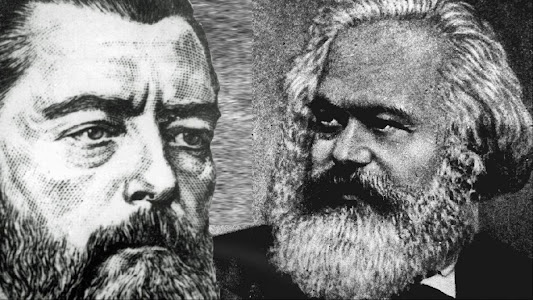The Marxian Rejection of Logic and Human Nature - "Theses on Feuerbach" - Karl Marx
Theses on Feuerbach
Marx says that past modes of thinking have understood reality through the abstract mind, creating "objects" out of them, creating essences. Thus, to be "active" in society was to trade in ideas, philosophical arguments. He thinks that Feuerbach is even guilty of this, denigrating the practical and sensual side of things. Rather, for Marx, reality has no other essence than the one that we shape it into ... not by ideas, but by practical action. Sense experience is real, and practical action is the proper mode of being "active" in society. He makes this point clearly in his second thesis. 2 "The question whether objective truth can be attributed to human thinking is not a question of theory, but a practical question. In practice man must prove the truth, that is, the reality and power, the this-sidedness of his thinking. The dispute over the reality or non-reality of thinking which is isolated from practice is a purely scholastic question." 2
In this short essay, Marx provides 11 statements about his thoughts on Feuerbach's work. If I were to summarize them, I would say that essentially that Marx is critiquing Feuerbach for not going far enough in his thinking. Feuerbach, as one of the first philosophers to challenge the reality of the divine and metaphysical, claimed that it was all only a projection of the best parts of human beings. In that sense, he was an early Materialist. But Feuerbach still, Marx thinks, has made a mistake in holding on to the idea of rational or logical realm of human thinking. This includes even logical thinking about human experience or sense. For Marx, "truth" is the practical realm, it is the incarnating of revolution into society, into men's lives, not the abstract reason which he attributes to the Scholastics. Marx, then, is a full Materialist. If there is a "truth," then it is manipulation of the sensual world for the one in power.
Thesis I and II
 |
| Feuerbach and Marx |
Thesis III and IV
Marx then expresses the Materialist idea that men are simply the products of their circumstances and education. Therefore, he emphasizes that man can be formed and shaped by "revolutionizing practice." Human beings and truth are malleable. Speaking of social structures, Marx then critiques Feuerbach again for not taking his ideas far enough as to the reshaping of society. Marx says that if the earthly structures of the past were shaped in the light of our projection of divine structures, to then deny the divine structures alone is not going far enough. Rather, Marx advocates that even the structures left being of the religious world must be destroyed and reconstituted. He mentions, for example, the family. If we have been conceiving of the nature of the family based on the template of the Holy Family of Jesus, Mary, and Joseph, then even if society is stripped of its religious belief the family unit of the past still remains in the religious image. The nature of family then must be remade in a secular image.
Thesis V and VI
Marx says that the Materialist must not just think about the life of his passions and senses because this is still to abstract them. Rather, truth is the life of the senses which are shaped and implemented by practical action. 3 Likewise, with human nature. Marx claims that there is no human nature at all. Rather we are simply the mass of social relations which are artificially put together. There can be no abstract idea of the person, nor some natural structure by which people are brought together. 4 "Feuerbach resolves the religious essence into the human essence. But the human essence is no abstraction inherent in each single individual. In its reality it is the ensemble of the social relations." 5
Thesis VII and VIII
Marx then uses this idea to criticize man's religious desires. He claims that this desire is not something inherent in human nature itself, there is no human nature. Rather, it is the result of the arbitrary processes of society that in the past shaped man into that image. He also claims that any religious or mystical impulse is simply grounded in the arbitrary practices of that civilization.
Thesis IX, X, and XI
Since there can be no universal "human," there can be no such thing as a "civil" society. All there can be are individuals within a mass of other individuals. Marx prefers the term "socialized humanity." Again, to summarize, Marx rejects any conceptualization of the world, his new Materialism is about actively changing it to be what we want it to be.
------------------
1 - Marx, Karl. Marx and Engels: Basic Writings on Politics and Philosophy. Theses on Feuerbach. (Doubleday & Company Inc. Garden City NY. 1959). Pg. 243
2 - 243
3 - 244
4 - 244, 245
5 - 244




Comments
Post a Comment